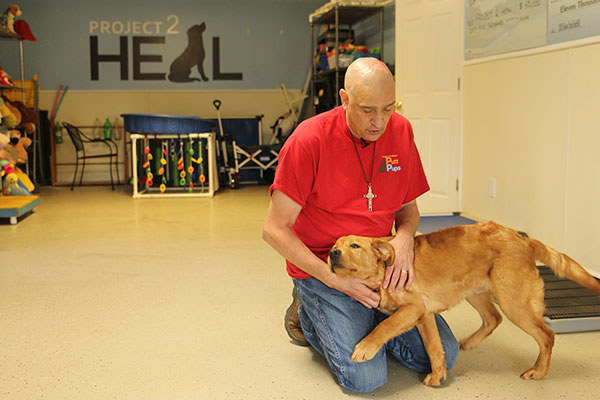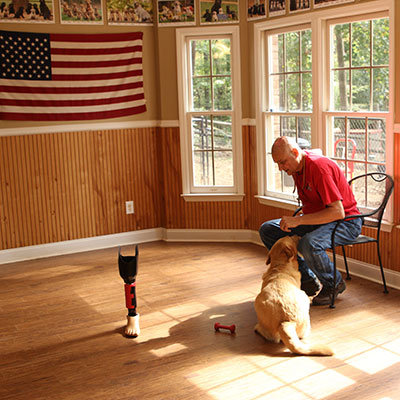‘These dogs are saving lives’
 WAXHAW — Thanks to a local Catholic couple and their ministry, dozens of veterans can attest that recovering from post-traumatic stress disorder starts with a puppy.
WAXHAW — Thanks to a local Catholic couple and their ministry, dozens of veterans can attest that recovering from post-traumatic stress disorder starts with a puppy.
Charlie Petrizzo and his wife Sandy breed and train Labrador Retriever puppies for veterans in need through their non-profit organization “Project2Heal.” Their trained service and companion dogs provide crucial emotional support to veterans who are struggling to recover from PTSD.
Petrizzo knows firsthand how canine companions can offer unique comfort to someone who is ill or infirm. He suffered two serious accidents when he was younger, and each time a family dog helped him through his painful recovery. After stepping back from the fast-paced world of finance, he felt called by God in 2005 to start the charitable organization in line with his Catholic faith, using his Waxhaw home and his own resources.
Over the past 15 years the Petrizzos have earned a reputation in the service dog breeding and puppy training world for being top in the field.
Service or companion dogs can be a vital lifeline for veterans, particularly those suffering from depression, uncontrolled anger or suicidal thoughts. A 2018 Purdue University Veterinary Medicine study documented that service dogs helped veterans by considerably reducing PTSD – instances of depression, hypervigilance, night tremors and outbursts of anger – brought on by their military service.
Project2Heal steps into this breach, and Petrizzo has seen the impacts.
“These dogs are saving lives,” he says.
One Marine veteran in his early 30s, who “was a picture of strength and courage,” once quietly approached Petrizzo during one of their training programs, he recalls.
“He gently placed his hand on my shoulder. He leaned in and was crying and whispered through tears, ‘Sir, thank you very much for this dog. I was a trigger pull from taking my life. Now I have him and he will take care of me and be my mission, and I promise you I will take care of him.’
“After he told me that, I turned to Sandy and I said, ‘We’re making a difference.’ That was one of the most moving things that has ever happened to me. This man was a battle-worn veteran. He outwardly looked like the picture of strength. Inwardly, PTSD was crushing him.”
Petrizzo also thinks about another Army veteran who traveled from Tennessee to obtain a companion dog through Project2Heal. The man had reached out to a number of service dog organizations, but money was an obstacle.
“He wrote a beautiful letter to me. I told him he may not need a service dog, he may need a companion dog.”
Petrizzo knew the moment he saw the veteran that he needed his help. “When he came here he was dripping sweat he was so nervous. He was gripping his head. I could see the PTSD. I could actually see the PTSD, the struggles he was having. I told him, ‘If you want a dog that is trained, but not a trained service dog, I will give one to you, a companion dog.’”
It costs thousands of dollars to breed, raise and train puppies to become either service dogs or emotional support dogs. Project2Heal begins training its puppies when they are two days old and continues training for eight to 12 weeks – until they are evaluated and given to a service dog training partner for more specialized training and placement. Dogs that do not pass the strict service dog testing process are instead trained and given to people in need of companion or emotional support dogs.
The need for Petrizzo’s puppies continues to grow, he says.
 “We’re doing work that no other organization does,” he explains. “We focus specifically on reducing the time and cost it takes to get a veteran, or a child with a special needs, a service dog… We have 20 kennels here. That’s really just the first step.
“We’re doing work that no other organization does,” he explains. “We focus specifically on reducing the time and cost it takes to get a veteran, or a child with a special needs, a service dog… We have 20 kennels here. That’s really just the first step.
“The challenge is when you get calls from 30 organizations, to really make a difference… if we could donate 10 puppies each to 15 organizations that would really change the dynamic and the amount of time that our veterans have to wait.”
Petrizzo hopes to expand the Project2Heal ministry using 50 acres that he recently bought nearby their current location. Besides adding to the number of kennels, he would like to build tiny houses for visiting veterans.
“So if veterans are waiting for a dog, from whatever organization, and they just want to come and stay in one of these tiny houses for a week or two weeks and stay and help us train and care for our puppies, maybe that is just what they need to hold them over,” he says.
“I want it to be a pastoral experience,” he continues. “It’s quiet. It’s peaceful. If the veterans come, they can help train the dogs. They can walk the hiking path we hope to build. They can fish.
They can quiet their minds and know that we are here to help.”
Petrizzo believes Project2Heal is God’s ministry. “He put it on our hearts to do this. It’s His ministry we are stewarding for Him...We pray for the things we need. And we pray for our puppies to be successful.”
— SueAnn Howell, Senior reporter
Help Project2Heal
The COVID-19 pandemic has hit Project2Heal hard, as it has most non-profits.
An annual golf fundraiser had to be canceled – a fundraising opportunity loss of about $85,000. A virtual event, the Project2Heal “Pup-A-Thon,” is planned for Dec. 4 to help bridge the funding gap. For details, go online to www.project2heal.org, or contact Charlie Petrizzo at 704-256-4056 or This email address is being protected from spambots. You need JavaScript enabled to view it..
CHARLOTTE — Every Catholic household in the Diocese of Charlotte is being asked to consider making a donation to the Seminarian Education second collection Nov. 7-8.
There is an increased need for funding as the number of men in formation for the priesthood in the diocese is rising. The number of seminarians has more than doubled in just a few years – from 16 seminarians to 41. There are 14 men in three major seminaries and 27 at St. Joseph College Seminary in Mount Holly.
The college seminarians moved into the permanent home for the seminary last summer, and for the first time in the seminary’s history, are now living all together under one roof as they discern a possible vocation to the priesthood.
This good news for future vocations is welcomed as the past 10 years have seen remarkable growth in the diocese.
A decade ago, there were 58,500 registered households. In 2019, that number was 68,000. By the year 2025 it is estimated that the number of registered households will climb to 86,800.
“Growth of this nature is paralleled by a need for priests to pastor this increasing number of Catholics,” Bishop Jugis said in an October letter to parishioners urging them to support the collection.
In the next decade, 27 priests are expected to reach retirement age. And as seven diocesan priests are actively serving although they are past the retirement age of 70, the need for more priests to serve the growing Catholic population in western North Carolina is great, he noted.
“We are both blessed and challenged. As you know, our challenge is to provide the funding needed to recruit, educate and form our future priests,” the bishop explained.
Besides praying for the seminarians by name, Bishop Jugis asks the faithful to consider making a gift to further support all diocesan seminarians.
— SueAnn Howell, senior reporter
Support Seminarian Education
To make a gift to support Seminarian Education, drop off or mail your contribution to your parish or make a secure gift online. If making an online gift, consult your parish’s website if they offer online giving or go online to charlottediocese.org/donate, then click on “Seminarian Education.”

